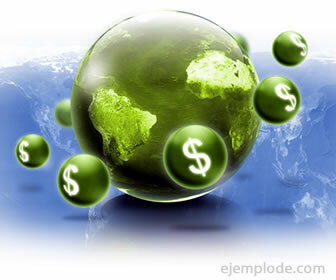Example of Transnational Companies
Administration / / July 04, 2021
Transnational companies are companies whose head office is registered in a country, and has branches or affiliated companies, which operate in other countries.
The companies work in a territorial scope that can be more or less limited. These areas can be:
Local: It is a company whose scope of work and action is limited to the town where it is established.
National: They are companies that have different plants or branches throughout the territory of a country, but without going abroad.
Transnationals: are those that have general offices in the country of origin where they are registered, and simultaneously work with industrial plants or commercial offices in other countries.
The transnational companies start their operations as local companies, which expand in their national territory, and due to the fame or quality of their products, they begin to export them.
However, in many cases export costs increase the cost too much of the products. To reduce this inconvenience, companies establish subsidiaries in which they produce its products in consuming countries.
The companies become transnational to reduce production costsSince in some countries raw materials are cheaper, while in others, labor is cheaper. So what these companies do is establish subsidiaries in charge of obtaining and transforming raw materials in producing countries. assemblers in the countries with the cheapest and most specialized labor force, and sending the finished products from the assembling countries to the countries consumers.

Whatever the scheme they follow (total or partial production in each country), transnational companies have as a common characteristic that their boards of directors are in their country of origin, and from there the programs and actions to be developed in each country are determined. At the same time, they have local councils, in charge of complying with the directives, conditioning them to the laws local, and make suggestions and market studies to create or commercialize the most suitable products for the market local.
Another way to create multinational companies is through the absorption or merger with local, national or transnational companies, to operate under a single management.
All companies that operate in 2 or more countries are multinational companies.
Example of multinational companies:
CEMEX (Cementos Mexicanos): Mexican company dedicated to the production of cement, concrete and aggregates for construction, has production plants in Latvia, Egypt, China, Israel, Bangladesh, Croatia, among others countries.
IBM (International Business Machines): American company, originally developed computer machines and developed some of the first languages of programming (IBM 360 for punch cards), and today is one of the leading technology, software and systems companies of security. It has subsidiaries in Canada, China, India, Germany, Spain and France, among others.
Telephone: Spanish telecommunications company, in some countries it operates as Movistar, vivo or Terra. It provides landline, cell phone and internet services in European and Latin American countries.
Bayer AG: From Germany, it is one of the largest pharmaceutical companies in the world. It produces medicines for both human and veterinary use. It has offices, industrial plants and laboratories in the United States, Canada, Mexico, Argentina, Bolivia, Brazil, Ecuador, Uruguay, Peru, Uganda, Mali, Palestine, Israel, Egypt, Rwanda, South Africa, United Arab Emirates, Iraq, Yemen, Jordan, Spain, France, Italy, Great Britain, Greece, Russia, China, Japan, Korea, Australia, among the most important.
Nestle: Swiss food company, produces milk powder, soluble coffee, sweets, chocolate, condiments and purified water. It has industrial plants in Mexico, El Salvador, Argentina, Colombia, Cuba, Ecuador, Uruguay, Spain, France, Italy, Great Britain, Nigeria, Angola, Egypt, Saudi Arabia, India, China, Japan, New Zealand ...
Gazprom: Russian gas company, is the largest gas supplier to Europe. It extracts gas in Siberia, and distributes it in Europe through its commercial offices in Germany, Ukraine, Estonia, Finland, France, Spain, Austria, Latvia
Michelin (manufacture Française des Pneumatiques Michelin): It is a French manufacturer of tires for automobiles, bicycles and heavy machinery. How much with plants and offices in Canada, the United States, Mexico, Panama, Ecuador, Peru, Brazil, Chile, Argentina, Botswana, South Africa, Namibia, Mozambique, Spain, Portugal, Poland, United Kingdom, Italy, Romania, Bulgaria, Turkey, Russia, China, Kazakhstan, Philippines, Australia, among others nations.
7-eleven: Japanese retail stores sell ready-to-eat products such as packaged food and bottled drinks, as well as over-the-counter medicines. It has stores in Mexico, the United States, Canada, Japan, South Korea, China, the Philippines, Australia, Singapore, Denmark, Sweden, Norway.
Samsung: Korean multimodal company, is a company that manufactures boats, home appliances, electronics, cell phones, pharmaceutical products and heavy machinery, among other activities. It has plants and assembly plants in France, China, Mexico, the United States, Brazil, Argentina, Chile, Australia, Switzerland, Belgium, Germany, Hungary, Singapore, among others.
Huawei: China Telecommunications Company, develops cell phones, fiber optic networks, modems, and telecommunications and internet systems. It has a presence in countries such as Brazil, Bolivia, Ecuador, Uruguay, Colombia, the United States, Mexico, Australia, the Philippines, Pakistan, Nepal, Ireland, Spain, Germany, Romania or Belgium.
30 names of companies that are transnational:
- America Mobil
- American Airlines
- Manzana
- AT&T
- Bimbo
- BNP Paribas
- CARREOUR
- Chevron
- Cinepolis
- CITIGRUP
- Daewoo Inc.
- Phillips
- Exxon Mobil
- Cadillac
- Ford Motor Company.
- Gasprom
- General Electric
- Gruma
- Bal Group.
- HSBC
- Hyundai corporation
- LG Electronics. Ltd
- MacDonald’s
- MAPFRE
- Met Life. Ltd.
- Chebrolet
- Petro bras.
- LIVE telecommunications.
- Volkswagen group
- WAL-MART.

